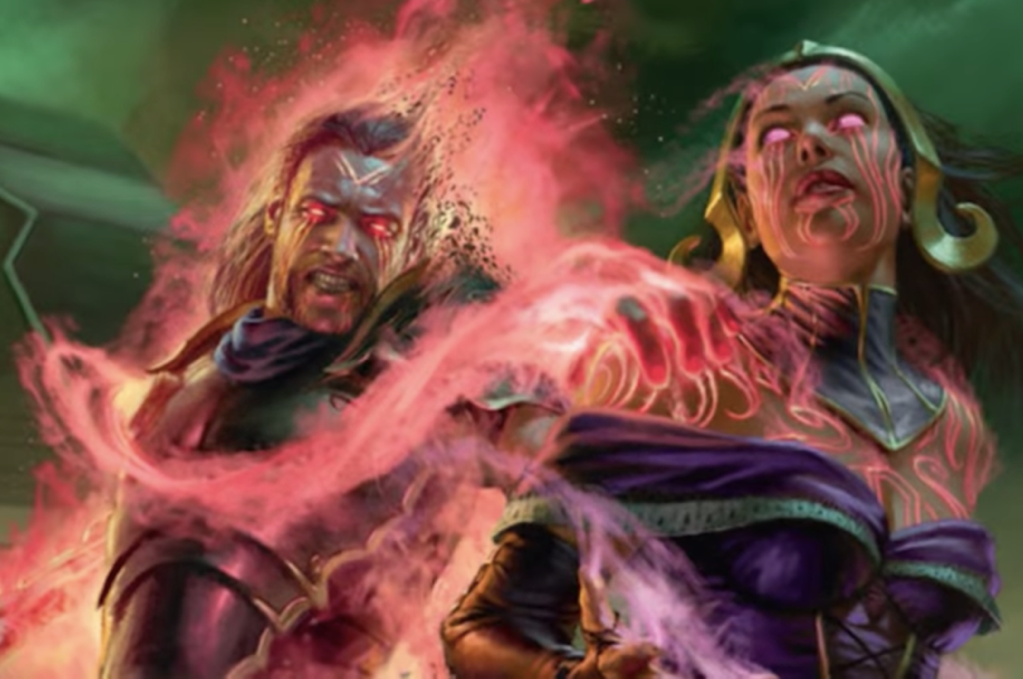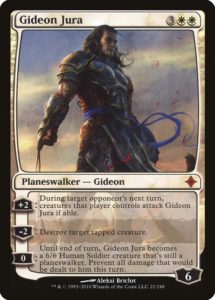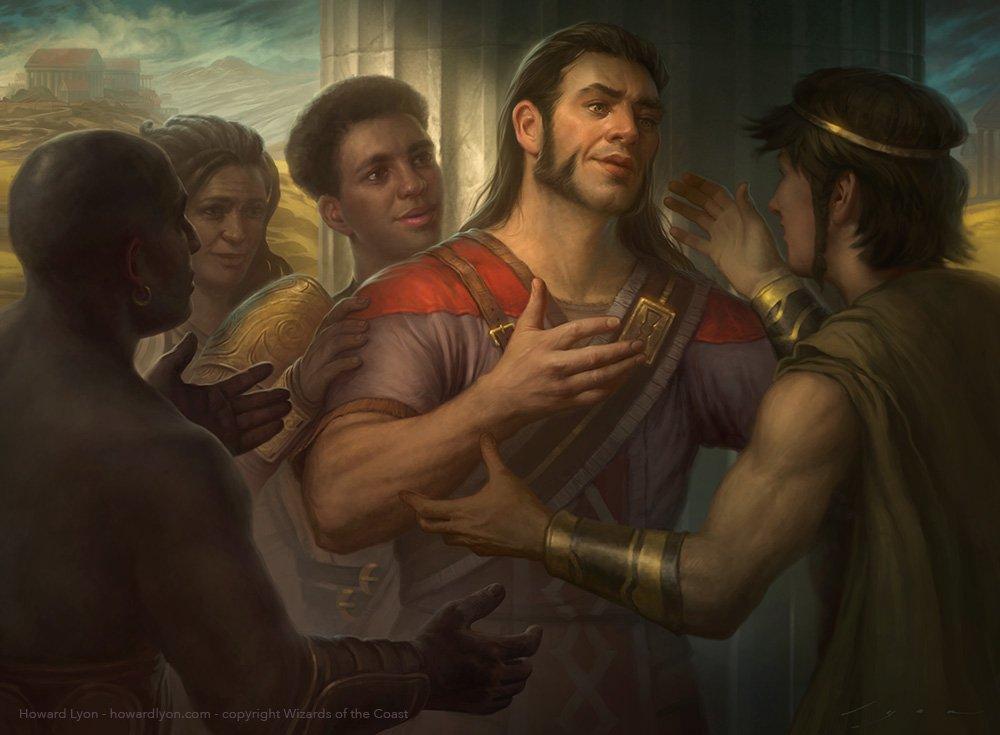Spoilers: If you are still holding out to read Greg Weisman’s War of the Spark: Ravnica novel for your fill of MTGWAR story, turn back now.
Content Warning: This article contains references to death, suicide, depression, and acute emotional distress.
The story for War of the Spark dropped on us like a hammer.
I won’t get into all the plot twists we saw depicted on the Story Spotlight cards from the set; that will be covered I’m sure in the book review. I want to focus on perhaps the most emotionally jarring plot point revealed to us: Gideon Jura sacrificing himself to save Liliana Vess.

“Gideon’s Sacrifice,” Art by Chris Rallis. Preview by The Mana Source.
Gideon transferred his power of invulnerability to his friend, taking the full brunt of the demonic contract’s magic upon himself. We can discuss forever about the gesture and optics of Gideon choosing to pay the price for Liliana, or Wizards choosing to write the story this way; but this fact remains part of the story that we cannot change.
For my part, when I saw this card, I finally realized that this was always how Gideon’s story needed to end. And that was because that’s how and when Gideon wanted himself to end the entire time. What I realized as I viewed these final previews from War of the Spark was that the way Gideon’s trauma manifested in his life was something that I have been experiencing for decades and have only recently been able to put a name to: passive suicidal ideation.
There Is Power in Abandon
The term “passive suicidal ideation” is a multi-layered one, so let’s discuss what we mean by it before we go any further.
This beautifully-written article by Anna Borges on The Outline explains the idea:
I don’t actively want to kill myself — I don’t have a plan, I don’t check the majority of the boxes on lists of warning signs of suicide, I have a life I enjoy and I’m curious about the future — but the fact remains, I don’t always feel strongly about being alive and sometimes, on particularly bad days, I truly want to die.
When we say passive suicidal ideation (PSI), we don’t mean the act of taking one’s own life, the attempt at it, or even planning it; we are discussing the “nebulous gray space between fleeting thought and attempt”. For me, this has shown up far less often as imagining actual self-harm than a more It’s a Wonderful Life-esque wish of never having existed, or the vivid fantasy of leaving my life and disappearing without a trace.
Borges equates her experience of living with PSI to living in an ocean. I’m similar. It’s like I have the sound of static from an old antenna TV tuned in-between the channels way off in some remote part of my house. I can hear it all the time if I focus on it, but I try to ignore it. Sometimes, the volume on the TV will turn up, sometimes the channel will tune in clearer and I can hear my self-doubts and fears shouting.
The feeling of living with PSI can be dejecting, frustrating, and totally boringly normal all at the same time. But how does this connect to Gideon?
Run Toward Danger
Michelle Rapp (@BalefireStrix on Twitter) wrote an incredible article last year on Gideon’s childhood trauma and the self-destructive tendencies we’ve seen from him over the course of Magic Story as a result. She lays out the case for his trauma incredibly well. After the deaths of his friends, which came directly as a result of his own actions and arrogance, Gideon began experiencing a host of root traumatic psychological disorders—survivor’s guilt, post-traumatic stress disorder, depression, avoidant personality disorder—and began working himself literally as close to death as he could. Michelle writes:
[Gideon] becomes obsessed with trying to save the innocent by fighting concurrent wars on two planes: Zendikar and Ravnica. Over a five-day period, he visits these planes on eight-to-ten-hour shifts, trying to save the refugees of Zendikar from the Eldrazi and taking down gang members with the Boros, all without sleep. He barely attends to his wounds and never asks for help.
But here’s where the analysis of Gideon’s psychological state diverges, depending on which lens you look through.
On one hand, Gideon begins to trust his new Gatewatch friends to be there for him on Zendikar. He begins to regain his faith in higher powers like the gods of Amonkhet, and he even starts to rebuild his own sense of self-worth on Dominaria—realizing that the teenager whose reckless actions had grave consequences is no longer the person whose tireless efforts have saved countless lives across the Multiverse.
But, in mental health, just because today was an “up” day doesn’t mean that the static has completely faded, or that you’re out of the ocean and on dry land. Gideon, while simultaneously rediscovering the value of his own life, still struggles through these stories with deep feelings of meaninglessness.
“What am I to learn from this?” I bellowed across the chamber . . . “What purpose are these deaths to serve?“ (“Brazen”, from the Amonkhet arc of Magic Story, by Michael Yichao)
Gideon is tossed between faith and doubt, between conviction and confusion. He tries to find something, anything to cling to and give him a sense of which way is up and a reason to go on during his darkest moments. Anna Borges mentions this in her article on PSI:
I’ve become adept at treading. I know — or I suspect, or I dread — that my legs will exhaust and I will slip beneath the surface, but I don’t want it to be soon. For now, I can and want to keep my head above water. But will is never enough, and so I have learned to surround myself with ways to stay afloat.
Some are like passing driftwood: Living to see the series finale of Crazy Ex-Girlfriend. Finishing that book that’s been taking up brain real estate for years. The prospect that maybe tonight will be the night I meet someone halfway decent on Tinder. They’re shallow motivators, hardly anchors to life, but sometimes you just need something that will get you through the month. Or the week. Or the night.
This is the conundrum that we who live with PSI face: not only are we afraid to live, we are afraid to die. More times than I want to admit, I have actually planned the way I would end my life, only to walk away because I was worried it would hurt too much before I went, that I would do it wrong and be forced to come back, or—worst of all—that I would be even more of a disappointment and burden on my loved ones.
So I go on, as does Gideon. But Borges also mentions the stronger bonds that keep her afloat:
Others — medication, my crisis safety plan. My cats who depend on me. The awful thought of transferring my suffering to my loved ones — are more sturdy. These are the life preservers.
And it’s these life preservers, these beacons of hope and signals of worth, that get us through, that give us the hope we need to not just ignore the static, but actually turn the volume down. For Gideon, it’s being there to listen to Liliana as she faces some of the toughest, most personally trying challenges of her life. It’s being the inspiration and heart of the Ravnican resistance to Bolas in the War of the Spark, while finally admitting that he cannot do everything alone.
Through his journey to rebuild meaning in his life, Gideon finally connects them in his final moments. No longer is he selfishly throwing his body into battle as a form of self-flagellation. Gideon finds the strength to make a selfless decision in his final moment—using his invulnerability to save his friend, something he wasn’t able to do many years before. For the first time in so long, Gideon actively wants to live and that gives him the strength to give his life for someone he loves.
The Advantage in Any Scenario
From the first time we met Gideon Jura in the card game itself, in Rise of the Eldrazi, we saw already the person he was and who he would be to Magic Story. His most commonly used ability encourages his enemies to direct their attention from you, the player, and attack him.

But if Gideon does not want to die, how is this not contradictory to everything we talked about?
As much as he puts himself in danger repeatedly for others in the Magic Story, Gideon has never once turned his sural upon himself and actually committed self-harm (that we know of, at least). He has never planned out the way he would die and then acted to make it happen, as far as we have seen.
On Amonkhet, when Nicol Bolas confronts Gideon with the realization that he is still powerless to stop all he loves from being destroyed, Gideon plummets from treading water to gasping for air. The static swells in his ears.
“I could kill you, Gideon, anytime I want. But I suspect you would not mind dying . . . Stay and die, or leave and live. I am content either way.”
Gideon was shocked to realize that a part of him yearned to stay. To no more feel the guilt of losing Drasus, Olexo, all his Irregulars. All the people he had seen die on Zendikar. He didn’t want any more death on his hands. He could just . . . let go.
Distressing images swarmed through his head. Drasus staring at him, spitting the word, “Coward!” Erebos looming over him, the laughter of the God of Death rattling in his head, “Yes, coward, come to me!” Chandra screaming at him, “Traitor!” In the end, it was the dragon’s indifference that settled his choice. (“Hour of Devastation” from the Amonkhet arc of Magic Story, by Ken Troop)
This is where analysis of Gideon to this point falls short: our inability (and perhaps fear) to identify and name his passive suicidal ideation. More explicitly than ever before, in this passage, we read Gideon’s lifelong yearning to be rid of his pain. One of the only things that stops him is fear—fear of losing, of being labeled a coward, of giving up when he had just a bit more to give.
We who feel this daily struggle go on because we care immensely about others in our lives. We go on despite feeling worthless because we know that others see our worth, and that helps convince us. But always, there is a pain. Unfortunately, no amount of medication or therapy can make that go away for some of us, though these certainly helps to keep it in line and keep us on top of it.
Gideon also felt that pain acutely every day of his life, it seems. So, it’s no wonder to me that he took advantage of a moment where he could save the life of a friend and simultaneously save himself from his life of suffering.
We can mourn Gideon’s loss, and wonder about what might have gone differently if he didn’t choose to surround himself with more pain every day. We can be sorrowful that he didn’t truly give himself a chance to grow more and move beyond his grief. Perhaps if Gideon had realized that it was okay to hurt and possible to continue on sooner, if he had let others empathize with him, things would have ended up differently. But we also need to recognize that his hurt was so tremendous, and that’s why he made the choice he did. As a character, I cannot fault Kytheon Iora for finally finding peace.
For us in the real world, however, I want to say this clearly: Gideon’s choices are not a path to emulate; they are not a model for how to behave in a healthy mental and physical way, but they are choices that many of us who struggle with mental health have to make every day.
Our battles are smaller, but the stakes are no less, and every single one of us—suffering from PSI or not—deals with these stakes. Just having empathy and understanding your fellow planeswalkers’ burdens could make a difference in a way you may never know.

“Heartwarming Redemption,” Art by Howard Lyon. Preview by The Mana Source.
If you’re thinking about suicide or just need someone to talk to right now, you can get support from any of the resources below (thank you to Anna Borges for compiling this list).
National Suicide Prevention Lifeline
1-800-273-TALK (8255)
Crisis Text Line
Text HOME to 741-741
International suicide hotlines
A comprehensive resource list for people outside the US.
IMAlive
Click Chat Now to access a live online network of volunteers through instant messaging.
TrevorLifeline, TrevorChat, and TrevorText (LGBTQ+ crisis support)
1-866-488-7386
Text “Trevor” to 1-202-304-1200
Trans Lifeline
US: (877) 565-8860
Joe Redemann is a Vorthos writer for HOTC, specializing in Magic Story and lore. He seeks to connect the stories of the Multiverse to our own daily lives, exploring social issues and philosophical questions through the lens of Magic in both his writing and podcast, Goblin Lore.

